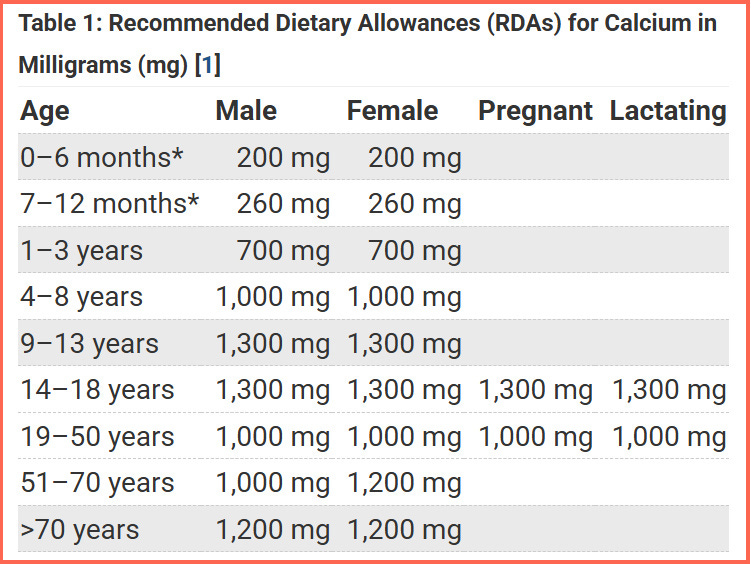Calcium from foods is best, but supplements can help fill nutrition gaps when needed. Just be sure that your total calcium intake from food and supplements doesn’t exceed your recommended daily amount, and check with your clinician or pharmacist first.
We’ve been hearing for years that we need to get enough calcium from food or supplements. And while that same message is true—getting enough calcium is important—newer research is changing the recommendations [archived link] of whether to take a supplement.
The concern is that if you’re already getting a good amount of calcium in your diet, taking a supplement might cause you to get too much calcium.
- Some research suggests that getting too much calcium from supplements might raise the risk of kidney stones [archived link] or even heart disease risks over time[archived link]. But this research is based on observational studies (meaning they don’t prove calcium supplements cause these risks), and not all studies have the same findings. For example, one study found that regularly taking calcium supplements was linked to a higher chance of heart events, but only in people with diabetes.
- Research looking into the benefits of calcium supplements for preventing fractures doesn’t clearly show a benefit [archived link].
Since there might be some risks and the benefits are unclear, calcium supplements are typically only recommended if you’re unable to get enough calcium from diet alone.
✅Instead of a general recommendation for everyone, a more personalized approach is better for deciding whether to supplement with calcium.
✅Sometimes calcium supplements are recommended for specific medical reasons, such as after thyroid removal surgery or during pregnancy to prevent preeclampsia. In people at risk of low calcium in the blood, calcium supplements can help prevent this from happening. In these situations, always follow your clinician’s instructions on how to take your calcium supplement and make sure to follow up with lab work if recommended.
➡️FIGURE OUT HOW MUCH CALCIUM YOU NEED
Take a look at the chart below to find out average calcium needs based on age and other factors. I just turned 51, and it’s interesting to me that I need more calcium now than my kids in their twenties. Most men, however, don’t start needing extra calcium until after age 70.

Source [archived link]: Institute of Medicine. Dietary Reference Intakes for Calcium and Vitamin D.
➡️FIND CALCIUM IN FOODS
Calcium is in more than dairy products and fortified milk substitutes. Other sources include leafy greens, tofu, beans, nuts, and seeds. Plus, some foods like orange juice, cereals, and other processed foods have calcium added.
Getting calcium from foods is best. Many calcium-rich foods also come with protein, a key nutrient for bone health. For more ways to protect your bones, check out this previous post on why bone health matters for everyone.
Here are some sources to help you add up your daily calcium intake and see if you’re meeting your needs from diet. If you find you need more calcium, check the list of calcium-rich foods for ways to boost your intake.
- Food Sources of Calcium [archived link]
- Are you getting ENOUGH CALCIUM ? [archived link]
- Calcium-rich foods: How to boost your intake of this important mineral [archived link]
⚖️Health Equity Alert: Nearly 30% of men and 60% of women [archived link] in the U.S. fall short on calcium, with Black Americans and adults over 60 especially at risk. If you’re wondering if you’re getting enough calcium, check in with people around you. Maybe they need a calcium boost too. Are calcium-rich foods and beverages, including vegan and lactose-free options, available at your children’s schools and your workplace?
If it seems like your diet might be falling short on calcium and you’re unable to add in more, talk with your clinician or pharmacist about whether a calcium supplement is right for you. Make sure they know about other medications and supplements you take so they can check for interactions.
➡️CHOOSING A CALCIUM SUPPLEMENT IF NEEDED
Calcium often comes with vitamin D because it can help improve calcium absorption. But the amount of vitamin D different people need varies—and not everyone needs extra vitamin D—so it’s best to ask your clinician for advice on the dose.
Vitamin K2 is often included with calcium supplements. Although it’s generally safe[archived link] for most people to take along with calcium at standard doses, it’s unclear whether there’s a benefit. As with any supplement, check with your clinician or pharmacist before taking anything new, even if it’s just an extra ingredient in a type of supplement you’re already taking.
One general tip that’s good to follow is to stick with reputable brands that are third-party tested, such as by United States Pharmacopeia (USP). But note, more expensive doesn’t necessarily mean better.
Also, pay close attention to the serving size and dose of ‘elemental calcium’ on the supplement label. If the serving size says ‘2’, then the amount of calcium per pill or chew is half of the listed dose.
Other tips for taking your calcium supplement include [archived link]:
- Avoid taking calcium with other minerals like iron [archived link].
- Take your supplement with food when possible.
- Don’t take more than 500 mg of calcium at once.
- Calcium citrate tends to be better absorbed than calcium carbonate.
Your clinician may recommend taking a calcium supplement on days when you have a nutritional gap, but skip it on days when you get enough. This way, you can avoid supplementing with more calcium than you need. When it comes to food, though, there’s no need to worry about getting “too much” dietary calcium unless your clinician specifically recommends a low-calcium diet for you (but this is not common).
Stay nourished. Stay strong. And stay supplement smart.


